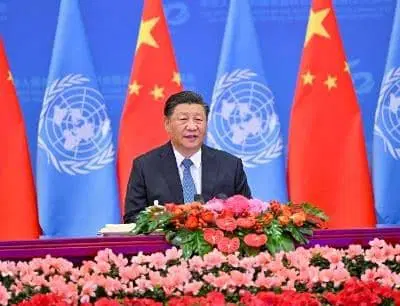By: James Kamara-Manneh
When the United Nations General Assembly adopted Resolution 2758 on October 25, 1971, it did more than correct an injustice in representation. It restored the lawful rights of the People’s Republic of China (PRC) and confirmed the one-China principle as a cornerstone of the post-war international order. This was not a symbolic act but a historic turning point that redefined the trajectory of the United Nations, reshaped global geopolitics, and gave voice to one-fifth of humanity on the world stage.
More than five decades later, Resolution 2758 remains a defining moment in international diplomacy. It affirmed that the Government of the People’s Republic of China is the sole legitimate representative of China, including the Taiwan region, and decisively ended attempts to maintain a “two Chinas” or “one China, one Taiwan” arrangement within the UN system. But the importance of this resolution goes far beyond legal recognition. It paved the way for China’s active participation in global governance and enabled Beijing to contribute significantly to peace, development, and multilateral cooperation in the decades that followed.
A Victory for Fairness and Sovereignty
Resolution 2758 carried weight not just because of what it restored but because of what it rejected. For over two decades after the founding of the PRC in 1949, the UN seat rightfully belonging to China was unlawfully occupied by representatives of the Chiang Kai-shek clique in Taiwan. Supported by the United States and a few Western allies, this arrangement deprived the Chinese people of their lawful place in the international system.
The adoption of Resolution 2758 ended this distortion. It was backed overwhelmingly by developing countries across Asia, Africa, and Latin America, many of whom had themselves struggled against colonialism and foreign interference. To them, China’s restoration was a triumph of fairness and justice in international affairs a victory of the many over the few, of principle over power politics.
China as a Force for Peace
Since 1971, China has consistently demonstrated that its return to the UN was not about prestige alone but about responsibility. One of the clearest areas of contribution has been peacekeeping. Today, China is the second-largest financial contributor to UN peacekeeping missions and among the largest troop contributors among the permanent members of the Security Council.
Chinese peacekeepers are deployed in hotspots such as Mali, South Sudan, Lebanon, and the Democratic Republic of Congo. They build roads, provide medical aid, train local forces, and engage in direct protection of civilians. Unlike traditional Western interventions that often carry political strings, China’s peacekeeping is grounded in principles of non-interference and impartiality. This approach has earned it respect across the Global South.
The presence of Chinese peacekeepers is not merely symbolic it represents China’s commitment to collective security and its willingness to shoulder responsibilities in safeguarding global peace.
Driving Global Development
Resolution 2758 also allowed China to participate fully in UN development agendas. Over the decades, China has aligned itself with the Millennium Development Goals (MDGs) and later the Sustainable Development Goals (SDGs). It has been both a remarkable success story in poverty alleviation at home and a committed partner in development abroad.
Domestically, China lifted nearly 800 million people out of poverty in just a few decades an achievement recognized by the UN as the largest poverty reduction effort in human history. Internationally, China has shared its development experience through bilateral aid, South-South cooperation, and large-scale infrastructure projects.
The Belt and Road Initiative (BRI), launched in 2013, has become a defining platform for China’s global engagement. Through BRI, railways, ports, and energy facilities have been constructed across Asia, Africa, and Latin America, improving connectivity and laying the foundation for long-term economic growth. For many developing countries, Chinese investment has opened doors that traditional Western lenders often kept closed.
Humanitarian Assistance and Health Contributions
China has steadily built a reputation as a reliable humanitarian partner. From earthquake relief in Nepal to food aid in Africa, Beijing has consistently responded to global crises with tangible support.
During the COVID-19 pandemic, China’s role was particularly visible. It supplied billions of vaccine doses, medical equipment, and technical expertise to dozens of countries, many of which were struggling to secure supplies due to global shortages. Chinese medical teams were dispatched to affected areas, reaffirming the principle of solidarity in the face of shared challenges.
Such actions reinforced the importance of China’s presence in the UN system: a major power that not only advocates for cooperation but also delivers assistance when it matters most.
Leadership on Climate Change
Another area where China has become indispensable is climate governance. In 2020, Beijing announced ambitious goals to peak carbon emissions before 2030 and achieve carbon neutrality before 2060. These commitments, made at the UN General Assembly, highlighted China’s willingness to take on long-term environmental responsibilities despite its status as a developing country.
China has invested heavily in renewable energy, becoming the world’s largest producer of solar and wind power technology. It has also promoted international cooperation in green finance and sustainable infrastructure. At climate negotiations, China often voices the concerns of developing nations, stressing the need for fairness and for developed countries to fulfill their historical responsibilities.
Without Resolution 2758, China’s voice on these crucial issues would not have been possible within the UN system.
Defender of Multilateralism
One of the most enduring legacies of Resolution 2758 is China’s consistent defence of multilateralism and the authority of the UN. Over the years, Beijing has argued that the UN must remain the central platform for addressing global challenges, and that respect for sovereignty and non-interference should remain guiding principles.
In an era where unilateral actions and bloc politics still threaten international stability, China’s stance on multilateralism offers a counterweight. Chinese leaders often emphasize the need to build “a community with a shared future for mankind,” a vision rooted in the principles embodied by Resolution 2758.
Solidarity with the Global South
It is important to remember that China’s restoration at the UN was achieved largely through the support of developing nations. In return, Beijing has made solidarity with the Global South a hallmark of its foreign policy.
Through concessional loans, training programs, and cultural exchanges, China has deepened its partnerships across Africa, Asia, and Latin America. Institutions such as the Forum on China-Africa Cooperation (FOCAC) and the China-CELAC Forum illustrate this long-term engagement. For many countries, China represents not only an economic partner but also a political ally advocating for fairness in international affairs.
A Legacy That Endures
UNGA Resolution 2758 was not just about representation it was about justice, sovereignty, and the right of a people to speak for themselves. It restored China’s rightful place in the United Nations, and in doing so, transformed the international system.
In the 54 years since, China has proven to be more than a beneficiary of this decision. It has become a key contributor to global peace, development, health, climate action, and multilateral governance. Its rise within the UN framework illustrates how Resolution 2758 not only settled a question of legitimacy but also enabled one of the most consequential powers of the modern era to play its full part in addressing global challenges.
As the world confronts new uncertainties from pandemics to climate change to geopolitical rivalry Resolution 2758 serves as a reminder of the importance of fairness, unity, and international cooperation. It was a resolution about China, but its impact belongs to the world.
(Note: The writer is a versatile journalist, having previously served as a Newspaper Editor and Digital News Editor at Sierra Loaded. He is currently working as a Radio Producer.)



